The AnandTech Coffee Lake Review: Initial Numbers on the Core i7-8700K and Core i5-8400
by Ian Cutress on October 5, 2017 9:00 AM EST- Posted in
- CPUs
- Intel
- Core i5
- Core i7
- Core i3
- 14nm
- Coffee Lake
- 14++
- Hex-Core
- Hyperthreading
Benchmarking Performance: CPU Encoding Tests
One of the interesting elements on modern processors is encoding performance. This includes encryption/decryption, as well as video transcoding from one video format to another. In the encrypt/decrypt scenario, this remains pertinent to on-the-fly encryption of sensitive data - a process by which more modern devices are leaning to for software security. Video transcoding as a tool to adjust the quality, file size and resolution of a video file has boomed in recent years, such as providing the optimum video for devices before consumption, or for game streamers who are wanting to upload the output from their video camera in real-time. As we move into live 3D video, this task will only get more strenuous, and it turns out that the performance of certain algorithms is a function of the input/output of the content.
All of our benchmark results can also be found in our benchmark engine, Bench.
7-Zip 9.2: link
One of the freeware compression tools that offers good scaling performance between processors is 7-Zip. It runs under an open-source licence, is fast, and easy to use tool for power users. We run the benchmark mode via the command line for four loops and take the output score.
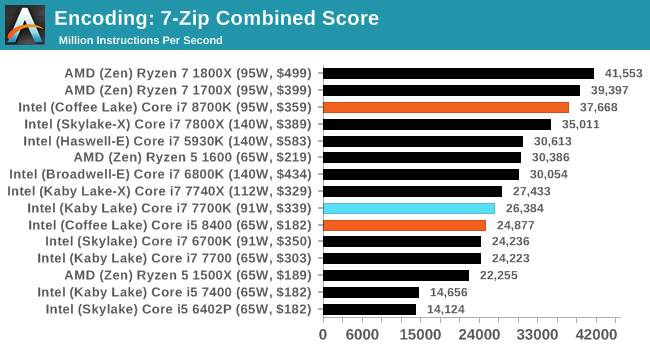
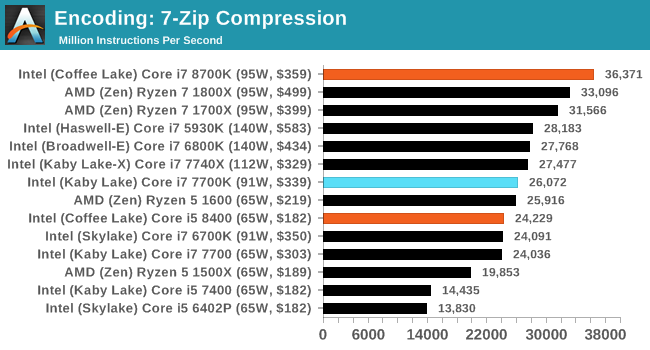
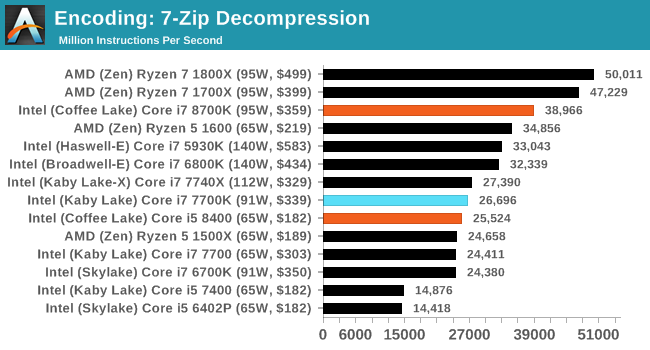
WinRAR 5.40: link
For the 2017 test suite, we move to the latest version of WinRAR in our compression test. WinRAR in some quarters is more user friendly that 7-Zip, hence its inclusion. Rather than use a benchmark mode as we did with 7-Zip, here we take a set of files representative of a generic stack (33 video files in 1.37 GB, 2834 smaller website files in 370 folders in 150 MB) of compressible and incompressible formats. The results shown are the time taken to encode the file. Due to DRAM caching, we run the test 10 times and take the average of the last five runs when the benchmark is in a steady state.
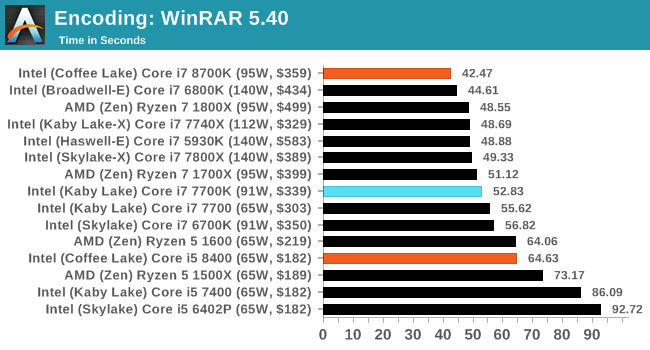
AES Encoding
Algorithms using AES coding have spread far and wide as a ubiquitous tool for encryption. Again, this is another CPU limited test, and modern CPUs have special AES pathways to accelerate their performance. We often see scaling in both frequency and cores with this benchmark. We use the latest version of TrueCrypt and run its benchmark mode over 1GB of in-DRAM data. Results shown are the GB/s average of encryption and decryption.
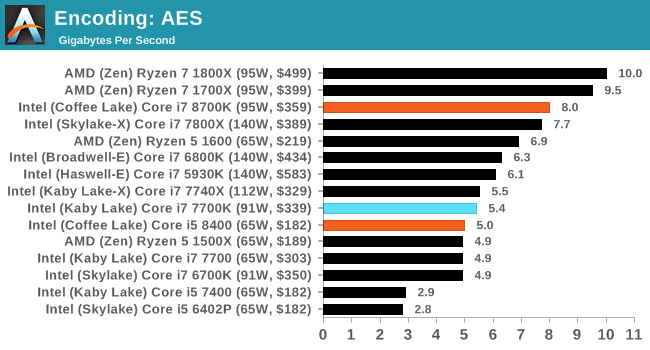
HandBrake v1.0.2 H264 and HEVC: link
As mentioned above, video transcoding (both encode and decode) is a hot topic in performance metrics as more and more content is being created. First consideration is the standard in which the video is encoded, which can be lossless or lossy, trade performance for file-size, trade quality for file-size, or all of the above can increase encoding rates to help accelerate decoding rates. Alongside Google's favorite codec, VP9, there are two others that are taking hold: H264, the older codec, is practically everywhere and is designed to be optimized for 1080p video, and HEVC (or H265) that is aimed to provide the same quality as H264 but at a lower file-size (or better quality for the same size). HEVC is important as 4K is streamed over the air, meaning less bits need to be transferred for the same quality content.
Handbrake is a favored tool for transcoding, and so our test regime takes care of three areas.
Low Quality/Resolution H264: Here we transcode a 640x266 H264 rip of a 2 hour film, and change the encoding from Main profile to High profile, using the very-fast preset.
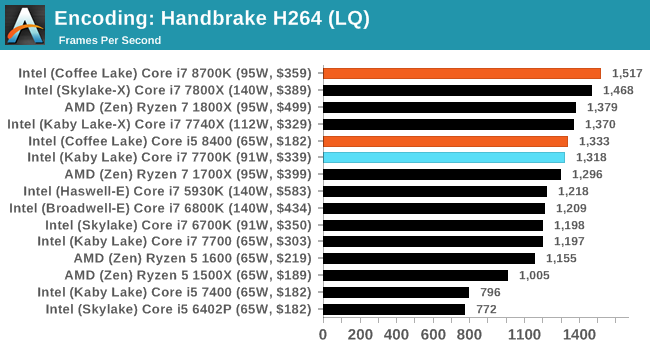
High Quality/Resolution H264: A similar test, but this time we take a ten-minute double 4K (3840x4320) file running at 60 Hz and transcode from Main to High, using the very-fast preset.
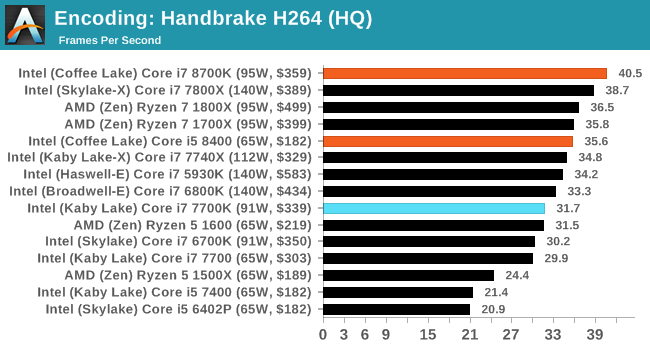
HEVC Test: Using the same video in HQ, we change the resolution and codec of the original video from 4K60 in H264 into 4K60 HEVC.
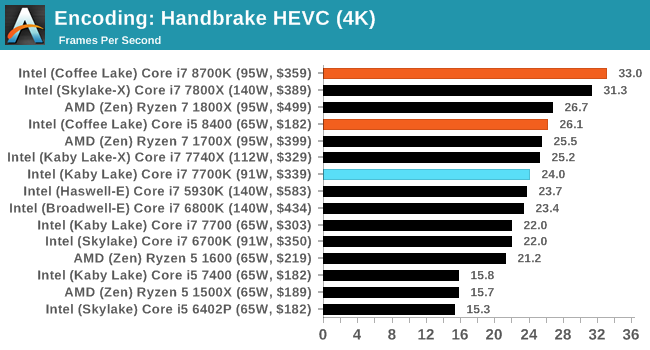










222 Comments
View All Comments
sirmo - Thursday, October 5, 2017 - link
No temperature comparison? According to some reviews I see Intel stubbornly continues to rely on their horrible TIM solution, after my horrible experience with Haswell overheating I am not considering Intel again in my build until this is fixed. There is nothing worse than when your build starts crashing because of overheating 2 years down the road.shreduhsoreus - Thursday, October 5, 2017 - link
The 8100 is basically a 6600 locked at it's quad core turbo frequency. Pretty decent for $120.Gordo-UT - Thursday, October 5, 2017 - link
Looking at these results, there is still no reason to migrate from my i7-2600k. Still running at 4.6 Ghz for years now, flawlessly with equal or better performace of all that came after. It would seem Moore's law failed to hold true for the past 5 years.For the price of a new i7, you can buy a used i7-2600k, z68 or z77 mobo, and 16 gb ram. It looks like that situation will not end soon.
Intel has to give me a compelling reason to spend a ton of money on NEW stuff.
vanilla_gorilla - Thursday, October 5, 2017 - link
"It would seem Moore's law failed to hold true for the past 5 years."Moore's Law is about transistor density, not performance.
mapesdhs - Friday, October 6, 2017 - link
For quite a lot less than a new i7, I bought a 3930K, ASUS R4E and 16GB/2400 RAM. And a 120mm AIO. And a 2nd R4E. :DCompelling reasons are perhaps more likely to come from peripheral and I/O scenarios, eg. if one wants the latest USB 3.1, M2 or somesuch. However, addin cards solve most of these, and numerous SB/SBE boards can now boot from NVMe. I saw great numbers with M.2 drives and Z68, and because of the wiring it should be possible for an M4E to use an M2 as boot and have two GPUs at x16 (aka 3.0 @ x8, same as modern mainstream split), while X79 has enough lanes anyway.
mapesdhs - Tuesday, October 10, 2017 - link
(btw, when I say a lot less than a new i7, I did mean the 8700K)SuperRobomike - Thursday, October 5, 2017 - link
5930k does surprisingly well compared to the 8700k in the gaming benchmarks (at least for the games tested). Any particular reason it would be doing so well? Can't think of any advantage it would have besides the quad channel memory.CTHL - Thursday, October 5, 2017 - link
Why are all these benches between sites so wildly different (with supposedly same settings/specs). RoTR has had some of the most absurd results... one has 8700k beating everything by 20fps, another has 7700k over 8700k by 40fps, and one even had a 6600k beating everything.firerod1 - Thursday, October 5, 2017 - link
i5-8400 is King performance/dollar!watzupken - Saturday, October 7, 2017 - link
The i5 8400 looks like a good value processor until you factor in the price of a Z370 motherboard which is the only chipset available.